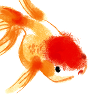What to feed your fish
We recommend feeding your goldfish a quality floating pellet. In our experience, floating pellets are preferable for most pond owners as they allow you to see if any food remains uneaten, which can then be easily removed. It is important to choose a pellet size that is appropriate for the size of your fish, as large pellets can be difficult for small fish to eat. We also recommend soaking your pellets in a small amount of water for a minute or so just before you feed your fish. This makes the pellet easier to digest for your fish.
While we’re not really in the business of selling fish food, the floating pellets that we predominantly use to feed our fish are available to purchase in either 250 g or 500 g bags.
How much to feed your fish
Goldfish are opportunistic feeders and will generally eat whenever food is available. This means that it is very easy to overfeed your goldfish. Goldfish should be fed no more than once a day and only as much as they can consume within 2-3 minutes.
Goldfish kept indoors, where the temperature is largely constant all year round, will eat roughly the same amount of food all year round. However, fish kept outside will eat varying amounts depending on the season:
Summer – goldfish are typically most active during the warm summer months and as a consequence they also eat the most during this time. Summer is also the period when goldfish grow fastest so make sure that you feed your goldfish a high protein diet.
Autumn – as the days grow shorter and the temperatures start to drop, your fish will be getting ready for the cold winter period of reduced activity. Supplement your normal feed with a bit of wheat germ or other carbohydrate rich food to allow your fish to build up their food reserves to sustain them over the colder months when they will naturally be eating less.
Winter – exactly how you should feed your fish in the winter months depends on how low the temperatures drop and how your fish respond to this. Feed your goldfish a carbohydrate rich diet but be aware that they will eat much less food during this time. Don’t allow uneaten food to remain in the pond as it will be damaging for your water quality.
Spring – as your fish begin to liven up and come out of their winter slowdown, their feeding requirements will change. Increase your goldfish’s feeding routine slowly as they start to become more active, shifting to a more protein-rich diet.
